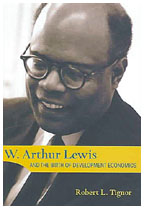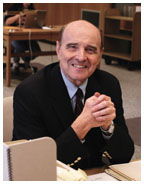March 22, 2006: Reading Room
Robert L. Tignor decided to write W. Arthur Lewis’ biography after he learned that Lewis’ widow had donated his papers to Mudd Library. (Denise Applewhite) |
The
pragmatic idealist
History professor Robert L. Tignor retraces the
life of economist W. Arthur Lewis
By Alex Barnett
The late W. Arthur Lewis, a leading light in the field of development economics and the winner of the 1979 Nobel Prize in economics, was born in 1915 on the tiny, impoverished island of St. Lucia, then a colony of the British Empire. In a new biography, W. Arthur Lewis and the Birth of Development Economics, published by Princeton University Press in December, Princeton history professor Robert L. Tignor traces the extraordinary journey of his friend and colleague, who in 1963 became Princeton University’s first black full professor. He retired in 1983.
 “Arthur
spent his life trying to understand questions that interest me,”
says Tignor, an expert on modern African history. “Why are some
countries so poor? How is economic development best promoted?” When
Tignor learned that Lewis’ widow had donated her husband’s
papers to Princeton, he couldn’t pass up the chance to write his
biography.
“Arthur
spent his life trying to understand questions that interest me,”
says Tignor, an expert on modern African history. “Why are some
countries so poor? How is economic development best promoted?” When
Tignor learned that Lewis’ widow had donated her husband’s
papers to Princeton, he couldn’t pass up the chance to write his
biography.
Lewis’ economic philosophy took shape after World War II, as the British Empire began to unravel and everybody — from British officials intent on reforming colonialism, to African nationalists intent on ending it — looked for ways to kick-start economic growth in the soon-to-be-ex-colonies. In a famous 1954 article, Lewis gave them a model. Poor countries, he claimed, have dual economies — part modern, part traditional — and many have virtually unlimited supplies of labor tied up in subsistence agriculture. Rapid growth was possible, Lewis argued, if cheap labor from the traditional sector was drawn into industry. “That article put development economics on the map,” says Tignor.
Many times in his career Lewis accepted invitations to advise policymakers, work he ultimately found disillusioning. Most notable was his brief tenure (1957–58) as the chief economic adviser to Ghana. This episode, almost tragic in Tignor’s retelling, offers a window into the interplay of economics and politics that led to Ghana’s collapse. Over and over Lewis gave good economic advice that Prime Minister Kwame Nkrumah, ruling a fragile, newly independent state, was unwilling or unable to follow.
Throughout Tignor’s book Lewis appears as a moderate, always seeking change “from within.” He opposed racial discrimination passionately, yet he never embraced radical politics. At Princeton Lewis stirred controversy with a 1969 PAW article (to read, click here) in which he urged black college students to reject the separatist rhetoric of the American black power movement and to avoid African-American studies in favor of subjects like chemistry and law. His argument was pragmatic: A small minority in a society dominated by large corporations and institutions, American blacks would not gain power by segregating themselves.
Lewis “didn’t think race should matter so much,” says
Tignor. “He really believed we could reason our way to a better
world.” ![]()
Alex Barnett is a staff member at the Princeton University Art Museum.
BOOK SHORTS
 The Courtier and the Heretic: Leibniz, Spinoza, and the Fate of God in
the Modern World — Matthew Stewart ’85 (W.W. Norton).
Stewart reinterprets the philosophical visions and relationship of two
17th-century philosophers: the reclusive Baruch de Spinoza, who believed
in a God who was identical with nature itself, and ambitious socialite
Gottfried Wilhelm Leibniz, an orthodox Lutheran who believed in a transcendent
God. Stewart is a writer in New York City.
The Courtier and the Heretic: Leibniz, Spinoza, and the Fate of God in
the Modern World — Matthew Stewart ’85 (W.W. Norton).
Stewart reinterprets the philosophical visions and relationship of two
17th-century philosophers: the reclusive Baruch de Spinoza, who believed
in a God who was identical with nature itself, and ambitious socialite
Gottfried Wilhelm Leibniz, an orthodox Lutheran who believed in a transcendent
God. Stewart is a writer in New York City.
 The King of Kings County — Whitney Terrell ’91 (Viking).
Set in Kansas City, Mo., and opening in the 1950s, this tale blends family
saga with the history of America’s suburban development. The protagonist
watches his father — part con man, part visionary — build
a suburban empire amid the cornfields of rural Kings County and eventually
recognizes the nightmare his father helped create. Terrell is writer-in-residence
at the University of Missouri, Kansas City.
The King of Kings County — Whitney Terrell ’91 (Viking).
Set in Kansas City, Mo., and opening in the 1950s, this tale blends family
saga with the history of America’s suburban development. The protagonist
watches his father — part con man, part visionary — build
a suburban empire amid the cornfields of rural Kings County and eventually
recognizes the nightmare his father helped create. Terrell is writer-in-residence
at the University of Missouri, Kansas City.
 The Hoopoe’s Crown — Jacqueline Osherow *90 (BOA
Editions Ltd.). This collection of poems deals with Jewish tradition and
history. Many of Osherow’s poems concern inconsistencies and mysteries
in biblical texts and biblical prophets and poets. She writes in traditional
poetic forms (sonnet, terza rima, villanelle, sestina) and free verse
while maintaining a conversational tone that mixes humor and seriousness.
Osherow is an English professor at the University of Utah.
The Hoopoe’s Crown — Jacqueline Osherow *90 (BOA
Editions Ltd.). This collection of poems deals with Jewish tradition and
history. Many of Osherow’s poems concern inconsistencies and mysteries
in biblical texts and biblical prophets and poets. She writes in traditional
poetic forms (sonnet, terza rima, villanelle, sestina) and free verse
while maintaining a conversational tone that mixes humor and seriousness.
Osherow is an English professor at the University of Utah. ![]()
By K.F.G.
For a complete list of books received, click here.

